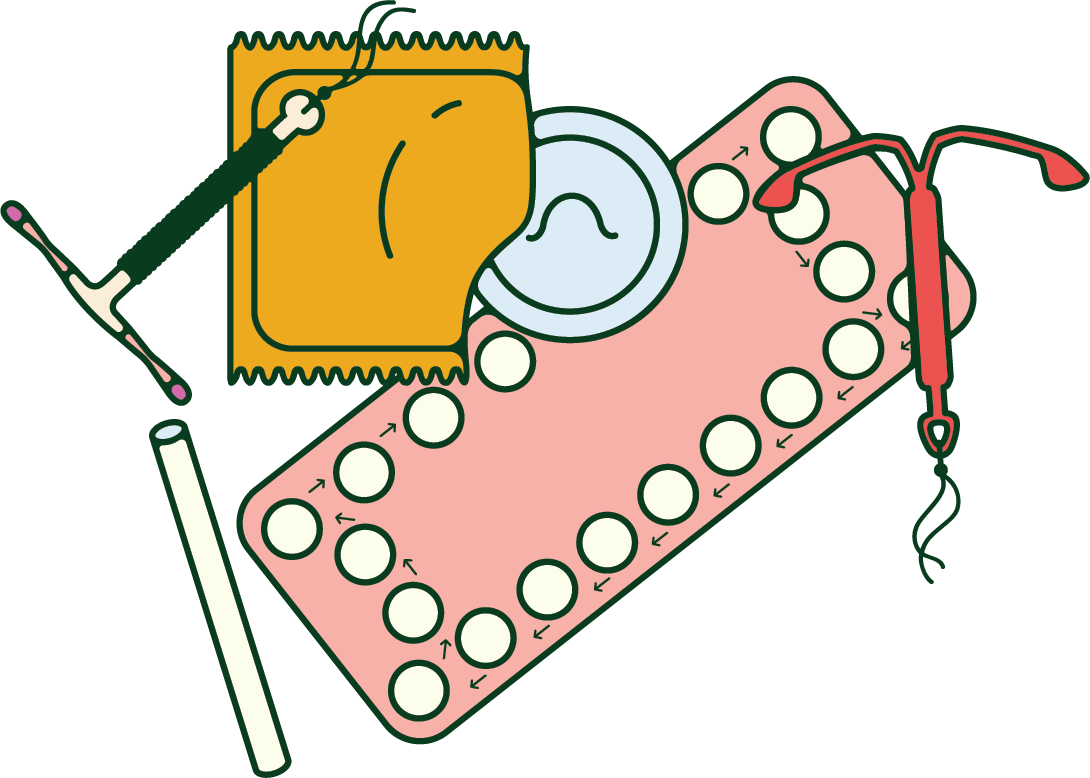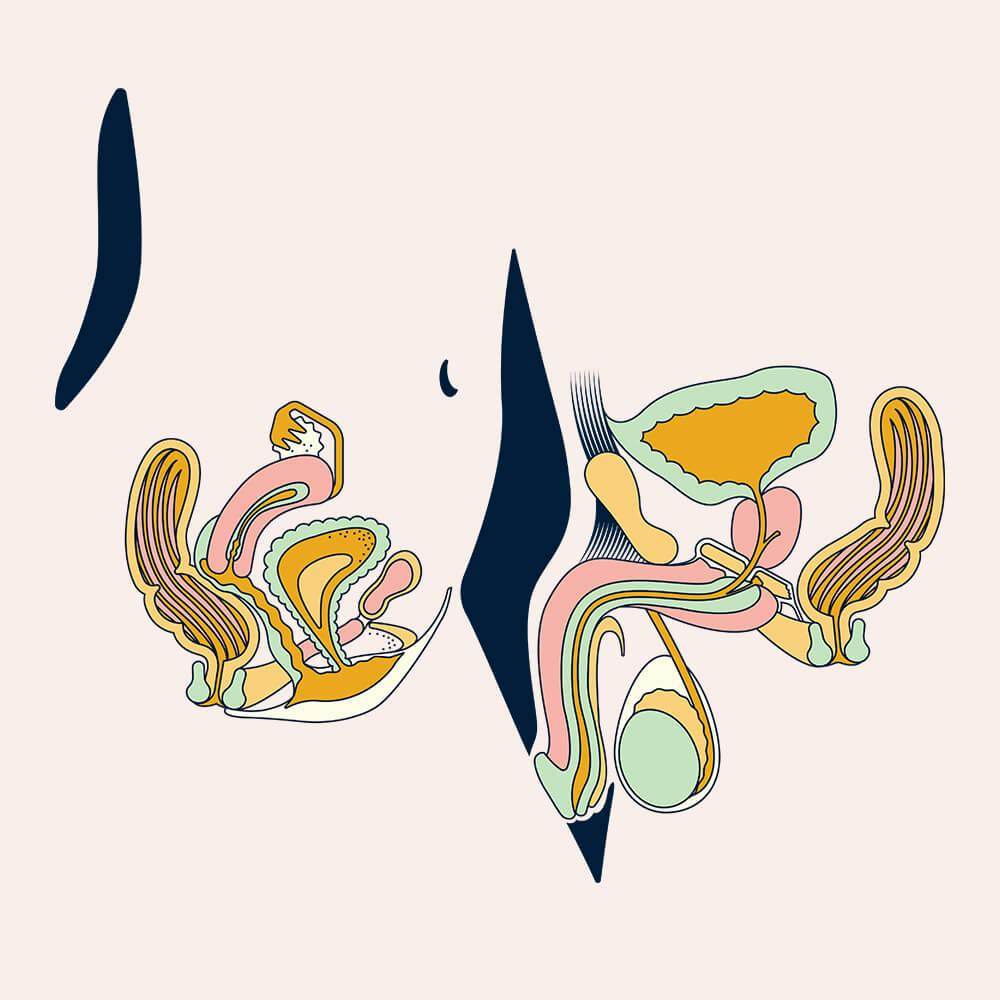Illustrated by Erin Rommel & Sabrina Bezerra
Some of today’s university students are navigating the tumultuous world of sex without ever having received comprehensive sex education, and they’re proactively turning to anonymous confessions pages on social media to start the conversations they should have had years ago.
The new and improved relationships and sex education (RSE) curriculum is set to be introduced in schools from September (to celebrate, the 2020 Sexual Health Awareness Week theme is RSE). The new curriculum is 20 years overdue, and addresses the previous lack of teaching on LGBTQ+ issues and the impact of the internet on sexual development – but these changes throw the gaps in the old RSE programme into painfully sharp relief.
“So I have chronic cystitis,” begins a post on anonymous confessions page Leed-ons. “Nothing seems to really help, cranberry tablets don’t seem to stop it and the doctors haven’t been much help so far. Has anyone got any advice?”
“I’m a lesbian,” reads another post – on Sheffessions this time, the confessions page for Sheffield-based students. “I’m scared to come out to my homophobic family so I thought I’d at least come out to Sheffessions. I’m gay.” The post has over 600 likes at time of writing, and in the comments, there’s nothing but support. “We love you,” one reads.

Daphne*, 21, is a student at the University of Leeds. She once submitted a post to Leedsfess reflecting on an unpleasant sexual experience she had. “This type of thing is difficult [to discuss] even when you’re speaking with a friend. There’s an appeal to being able to type something out rather than having to say it out loud, and it’s much easier to collect your thoughts that way.”
Almost every university in the UK has a confessions page. There’s Aberfess for Aberystwyth, Camfess for Cambridge, UOMLove for Manchester. And these pages have significant followings, too: Brumfess has over 12,000 likes, while Sheffessions has over 20,000. Usually, they feature students confessing everything from library crushes to stealing a housemate’s cheese.
But more recently, many like Daphne have used the opportunity for total anonymity on confessions pages to broach sensitive or taboo topics concerning sexual health. The set-up is reminiscent of early scenes in the Netflix hit Sex Education, where Otis offers his unseen clients advice through a toilet cubicle wall. It’s clear that when it comes to discussing sex, anonymity can be liberating.
Daphne says that posting on Leedsfess was a natural decision: given the lack of sufficient sex education at her school, she’s been going online to get answers for years. “[At school] sex ed was more scientific, about sperm and eggs,” Daphne remembers. “I definitely recieved more sex education online than I did at school.”
She’s not alone – a survey by The Student Room revealed that the majority of students found the internet the most helpful sex ed resource.

It’s unsettling that students have to struggle to get answers which should have been taught to them in school. Daphne took matters into her own hands by turning to the internet for RSE – but what about those who never did?
A recent report by the Houses of Parliament found that there is a lack of knowledge among young people “surrounding abusive relationships and consent”. It doesn’t help that between 2014/15 and 2019/20, the local authority public health budget was cut by £700 million – with the sexual health services budget cut by 25%.
Eleanor McKenzie is the editor and sex expert at web app and magazine, LVH romance. She’s glad that topics such as sexuality and gender are finally being covered in the new RSE curriculum – but is unsure if schools will ever provide totally comprehensive sex ed.
“What [RSE] doesn’t cover, and probably never will, is what you might call the ‘mechanics’ of sex, such as the benefits of masturbation methods or the intricacies of the female orgasm. As with most things, it all comes down to funding these resources,” she explains. “So, young people have to look elsewhere for that information.”
Like Daphne, Kemi* feels her sex education in school was insufficient too. “They didn’t talk about consent or stuff like UTIs.”
22-year-old Kemi is a student at the University of Glasgow. She’s submitted several posts to GlasKnow about her experience of casual sex, UTIs, and catching an STI. “I went to a health professional prior to posting these, so I submitted mainly to talk about my experiences and destigmatise sex issues like STIs,” she tells me. “It was nice to see that people were open and having discussions about it in the comment section.”

McKenzie flags a legitimate concern: the answers to submitted questions come from other students, not health professionals. “However, having looked at a few uni pages, it seems that they do point students towards getting professional help,” McKenzie concedes.
Kemi’s experience on GlasKnow reflects this, as she says a lot of comments on her posts provided herself and others with information on “where to get professional help and advice in Glasgow.”
21-year-old Frances* has also anonymously sought advice online. She’s a student at the University of Oxford and recently submitted a post to Oxfess about her experience of painful sex due to her smaller-than-average pelvis.
“Often pain during sex can be attributed to STIs or vaginismus, but that’s not what I have,” Frances tells me. “It was helpful to hear stories and advice from real people living with the same or a similar condition.”
Samira*, 21, similarly submitted a post to Liverpool’s confessions page, Liverfess. She wrote in to seek advice on how to go about asking a new partner if they’d recently had an STI test. She says the responses were “really helpful” and that the anonymity allowed her to be “a bit more honest about the situation.”
“These confessions pages are great. We’ve had a load of people speak up about assault, resources being made available, and things like that,” she explains. “As much banter as there is, it’s also a great safe space for students.”
Perhaps it’s a shame the considerable stigma surrounding sexual health means that many of today’s young adults only feel comfortable seeking help or reassurance when protected by the guise of total anonymity. But it’s no doubt still a huge step forward to see such candid discussion of everything from periods to BDSM on public platforms.
The admin for Leed-ons tells me that “most submissions are about sex and sexual health”: we’re seeing more and more of these posts opening up frank and honest discussion about sexual health, with commenters offering solidarity, validation, and support – and surely, that can only be a good thing.
*Names changed to protect anonymity






